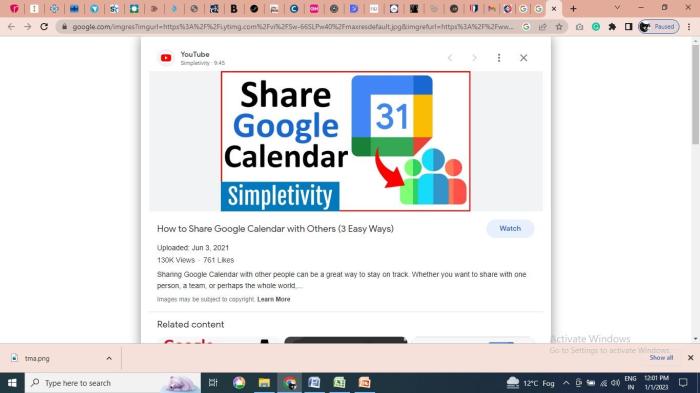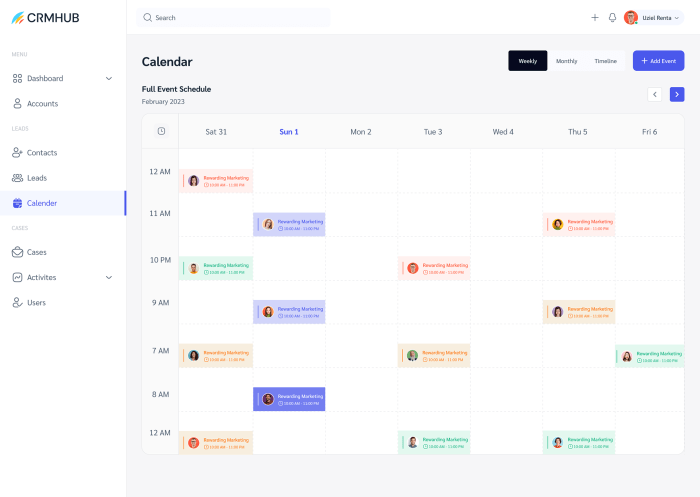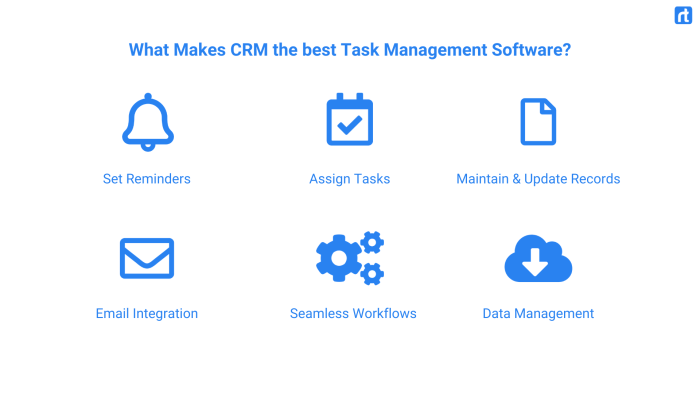Crm and task management software – In today’s fast-paced business environment, efficient organization and streamlined workflows are paramount to success. This is where Customer Relationship Management (CRM) and task management software step in, offering powerful tools to boost productivity and improve customer relationships. While often used separately, integrating CRM and task management systems can create a truly synergistic effect, leading to significant improvements in overall business operations.

Source: isu.pub
Understanding CRM Software
CRM software is designed to centralize and manage all interactions with current and potential customers. This includes tracking leads, managing sales pipelines, automating marketing campaigns, and providing a comprehensive view of customer interactions across multiple channels. Effective CRM implementation fosters stronger customer relationships, improves sales conversion rates, and ultimately drives revenue growth.
Key Features of CRM Software:
- Contact Management: Storing and organizing customer information, including contact details, purchase history, and communication logs.
- Lead Management: Tracking potential customers from initial contact to conversion, nurturing leads through the sales funnel.
- Sales Pipeline Management: Visualizing the sales process, monitoring progress, and identifying bottlenecks.
- Marketing Automation: Automating marketing tasks such as email campaigns, social media posting, and lead nurturing.
- Customer Support & Service: Managing customer inquiries, resolving issues, and tracking customer satisfaction.
- Reporting & Analytics: Generating reports and analyzing data to gain insights into customer behavior and sales performance. This includes key metrics like customer lifetime value (CLTV) and churn rate.
- Integration Capabilities: Connecting with other business applications such as email marketing platforms, e-commerce systems, and accounting software. This seamless integration is crucial for a streamlined workflow.
Popular CRM Software Examples:, Crm and task management software
- Salesforce
- HubSpot
- Zoho CRM
- Microsoft Dynamics 365
- Pipedrive
Understanding Task Management Software
Task management software focuses on organizing, prioritizing, and tracking tasks and projects. It helps individuals and teams collaborate effectively, improve time management, and ensure timely completion of projects. This software is invaluable for boosting productivity and reducing stress associated with managing multiple responsibilities.
Key Features of Task Management Software:
- Task Creation & Assignment: Creating, assigning, and delegating tasks to team members.
- Prioritization & Scheduling: Prioritizing tasks based on importance and urgency, and scheduling tasks for optimal workflow.
- Collaboration & Communication: Facilitating communication and collaboration among team members through comments, file sharing, and notifications.
- Progress Tracking & Reporting: Monitoring task progress, identifying delays, and generating reports on project completion.
- Project Management Capabilities: Managing multiple projects simultaneously, tracking deadlines, and allocating resources effectively. This often includes Gantt charts and Kanban boards.
- Integration Capabilities: Connecting with other applications, such as CRM systems, calendars, and email clients. This integration is vital for a holistic view of tasks within the larger business context.
Popular Task Management Software Examples:
- Asana
- Trello
- Monday.com
- Jira
- Notion
The Synergy of CRM and Task Management Software
Integrating CRM and task management software creates a powerful combination that streamlines workflows and improves efficiency. By connecting these systems, businesses can achieve a holistic view of their operations, enhancing productivity and customer satisfaction.
Benefits of Integration:
- Improved Team Collaboration: Centralized platform for communication and task assignment, reducing confusion and improving teamwork.
- Enhanced Productivity: Streamlined workflows, automated tasks, and improved time management lead to increased productivity.
- Better Customer Relationship Management: Improved communication, personalized interactions, and efficient issue resolution enhance customer satisfaction.
- Increased Sales Conversion Rates: Efficient lead management and timely follow-ups improve the chances of converting leads into customers.
- Data-Driven Decision Making: Comprehensive data insights from both CRM and task management systems facilitate informed business decisions.
- Reduced Operational Costs: Improved efficiency and automation lead to reduced operational costs and improved resource allocation.
Choosing the Right CRM and Task Management Software
Selecting the appropriate software depends on the specific needs and size of your business. Consider factors such as budget, scalability, integration capabilities, and ease of use. Many providers offer free trials or demos, allowing you to test the software before committing to a purchase.
Factors to Consider:
- Business Size and Needs: Select software that scales with your business growth and addresses your specific requirements.
- Budget: Consider the cost of the software, including licensing fees, implementation costs, and ongoing maintenance.
- Integration Capabilities: Ensure the software integrates seamlessly with other applications you use.
- Ease of Use: Choose user-friendly software that is easy to learn and use by your team.
- Customer Support: Look for a provider that offers reliable customer support and comprehensive documentation.
- Scalability: Ensure the software can adapt to your business’s evolving needs and accommodate future growth.
Frequently Asked Questions (FAQ)
- Q: What is the difference between CRM and task management software?
A: CRM focuses on managing customer relationships, while task management focuses on organizing and tracking tasks and projects. While distinct, they complement each other effectively. - Q: Can CRM and task management software be integrated?
A: Yes, many CRM and task management systems offer integration capabilities, allowing for seamless data flow and improved workflow. - Q: What are the benefits of integrating CRM and task management software?
A: Integration leads to improved collaboration, enhanced productivity, better customer relationships, increased sales, and data-driven decision making. - Q: How do I choose the right CRM and task management software for my business?
A: Consider factors like business size, budget, integration capabilities, ease of use, customer support, and scalability. - Q: Are there free CRM and task management options available?
A: Yes, several providers offer free plans or freemium models, but features may be limited compared to paid versions. - Q: What are some examples of CRM and task management software integrations?
A: Salesforce with Asana, HubSpot with Trello, Zoho CRM with Monday.com are common examples.
Conclusion
Implementing CRM and task management software, either individually or in an integrated system, is a strategic move for businesses aiming to improve efficiency, enhance customer relationships, and drive revenue growth. By carefully considering your business needs and selecting the right tools, you can unlock significant improvements in your operational effectiveness and overall success.

Source: behance.net
References
Call to Action
Ready to optimize your business processes and elevate your customer relationships? Explore the leading CRM and task management solutions today and discover how these powerful tools can transform your operations!
Questions and Answers
What are the key benefits of integrating CRM and task management software?
Improved customer relationship management, increased team collaboration, enhanced productivity, better resource allocation, and data-driven decision-making.

Source: rolustech.com
What are some examples of CRM and task management software integrations?
Many CRM platforms (Salesforce, HubSpot, Zoho) offer native integrations or app marketplace connections with popular task management tools (Asana, Trello, Monday.com).
How much does CRM and task management software typically cost?
Pricing varies greatly depending on the specific software, features, and number of users. Expect a range from free plans with limited features to enterprise-level solutions with substantial monthly or annual fees.
What are the challenges of implementing CRM and task management software?
Challenges include data migration, user adoption, integration complexities, and the need for proper training and ongoing support.
